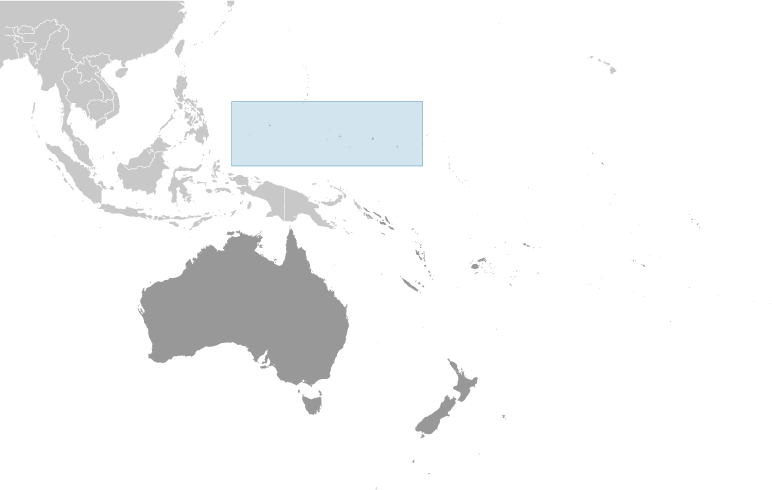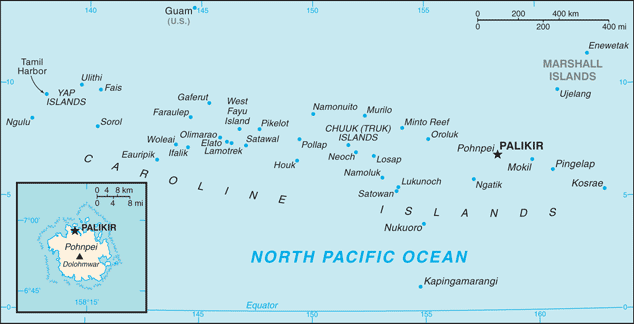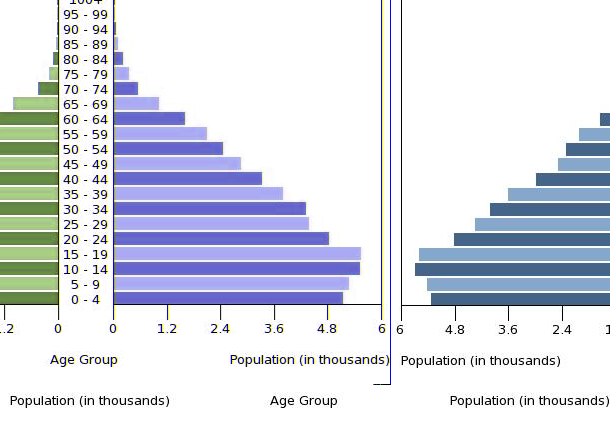Introduction :: MICRONESIA, FEDERATED STATES OF
-
The Caroline Islands are a widely scattered archipelago in the western Pacific Ocean; they became part of a UN Trust Territory under US administration following World War II. The eastern four island groups adopted a constitution in 1979 and chose to become the Federated States of Micronesia. (The westernmost island group became Palau.) Independence came in 1986 under a Compact of Free Association with the US, which was amended and renewed in 2004. Present concerns include large-scale unemployment, overfishing, overdependence on US foreign aid, and state perception of inequitable allocation of US aid.
Geography :: MICRONESIA, FEDERATED STATES OF
-
Oceania, island group in the North Pacific Ocean, about three-quarters of the way from Hawaii to Indonesia
6 55 N, 158 15 E
Oceania
total: 702 sq km
land: 702 sq km
water: 0 sq km (fresh water only)
note: includes Pohnpei (Ponape), Chuuk (Truk) Islands, Yap Islands, and Kosrae (Kosaie)
country comparison to the world: 191
four times the size of Washington, DC (land area only)
0 km
6,112 km
territorial sea: 12 nm
exclusive economic zone: 200 nm
tropical; heavy year-round rainfall, especially in the eastern islands; located on southern edge of the typhoon belt with occasionally severe damage
islands vary geologically from high mountainous islands to low, coral atolls; volcanic outcroppings on Pohnpei, Kosrae, and Chuuk
mean elevation: NA
elevation extremes: lowest point: Pacific Ocean 0 m
highest point: Dolohmwar (Totolom) 791 m
timber, marine products, deep-seabed minerals, phosphate
agricultural land: 25.5%
arable land 2.3%; permanent crops 19.7%; permanent pasture 3.5%
forest: 74.5%
other: 0% (2011 est.)
0 sq km NA (2012)
typhoons (June to December)
overfishing, climate change, pollution
party to: Biodiversity, Climate Change, Climate Change-Kyoto Protocol, Desertification, Hazardous Wastes, Law of the Sea, Ozone Layer Protection
signed, but not ratified: none of the selected agreements
composed of four major island groups totaling 607 islands
People and Society :: MICRONESIA, FEDERATED STATES OF
-
104,719 (July 2016 est.)
country comparison to the world: 194
noun: Micronesian(s)
adjective: Micronesian; Chuukese, Kosraen(s), Pohnpeian(s), Yapese
Chuukese/Mortlockese 49.3%, Pohnpeian 29.8%, Kosraean 6.3%, Yapese 5.7%, Yap outer islanders 5.1%, Polynesian 1.6%, Asian 1.4%, other 0.8% (2010 est.)
English (official and common language), Chuukese, Kosrean, Pohnpeian, Yapese, Ulithian, Woleaian, Nukuoro, Kapingamarangi
Roman Catholic 54.7%, Protestant 41.1% (includes Congregational 38.5%, Baptist 1.1%, Seventh Day Adventist 0.8%, Assembly of God 0.7%), Mormon 1.5%, other 1.9%, none 0.7%, unspecified 0.1% (2010 est.)
0-14 years: 30.81% (male 16,401/female 15,863)
15-24 years: 19.8% (male 10,406/female 10,326)
25-54 years: 38.8% (male 19,667/female 20,966)
55-64 years: 6.87% (male 3,532/female 3,659)
65 years and over: 3.72% (male 1,753/female 2,146) (2016 est.)
population pyramid:

Australia-Oceania
::MICRONESIA, FEDERATED STATES OF

Population Pyramid
A population pyramid illustrates the age and sex structure of a country's population and may provide insights about political and social stability, as well as economic development. The population is distributed along the horizontal axis, with males shown on the left and females on the right. The male and female populations are broken down into 5-year age groups represented as horizontal bars along the vertical axis, with the youngest age groups at the bottom and the oldest at the top. The shape of the population pyramid gradually evolves over time based on fertility, mortality, and international migration trends.
For additional information, please see the entry for Population pyramid on the Definitions and Notes page under the References tab.
total dependency ratio: 62.4%
youth dependency ratio: 55.3%
elderly dependency ratio: 7.1%
potential support ratio: 14.1% (2015 est.)
24total: 24.7 years
male: 24 years
female: 25.3 years (2016 est.)
country comparison to the world: 157
-0.49% (2016 est.)
country comparison to the world: 225
20.3 births/1,000 population (2016 est.)
country comparison to the world: 80
4.2 deaths/1,000 population (2016 est.)
country comparison to the world: 206
-20.9 migrant(s)/1,000 population (2016 est.)
country comparison to the world: 222
urban population: 22.4% of total population (2015)
rate of urbanization: 0.27% annual rate of change (2010-15 est.)
PALIKIR (capital) 7,000 (2014)
at birth: 1.05 male(s)/female
0-14 years: 1.03 male(s)/female
15-24 years: 1.01 male(s)/female
25-54 years: 0.94 male(s)/female
55-64 years: 0.97 male(s)/female
65 years and over: 0.81 male(s)/female
total population: 0.98 male(s)/female (2016 est.)
100 deaths/100,000 live births (2015 est.)
country comparison to the world: 71
total: 20.5 deaths/1,000 live births
male: 22.7 deaths/1,000 live births
female: 18.1 deaths/1,000 live births (2016 est.)
country comparison to the world: 81
total population: 72.9 years
male: 70.8 years
female: 75 years (2016 est.)
country comparison to the world: 137
2.45 children born/woman (2016 est.)
country comparison to the world: 79
13.7% of GDP (2014)
country comparison to the world: 6
0.18 physicians/1,000 population (2009)
3.2 beds/1,000 population (2009)
improved:
urban: 94.8% of population
rural: 87.4% of population
total: 89% of population
unimproved:
urban: 5.2% of population
rural: 12.6% of population
total: 11% of population (2015 est.)
improved:
urban: 85.1% of population
rural: 49% of population
total: 57.1% of population
unimproved:
urban: 14.9% of population
rural: 51% of population
total: 42.9% of population (2015 est.)
NA
NA
NA
note: active local transmission of Zika virus by Aedes species mosquitoes has been identified in this country (as of August 2016); it poses an important risk (a large number of cases possible) among US citizens if bitten by an infective mosquito; other less common ways to get Zika are through sex, via blood transfusion, or during pregnancy, in which the pregnant woman passes Zika virus to her fetus (2016)
33.2% (2014)
country comparison to the world: 12
NA
Government :: MICRONESIA, FEDERATED STATES OF
-
conventional long form: Federated States of Micronesia
conventional short form: none
local long form: Federated States of Micronesia
local short form: none
former: Trust Territory of the Pacific Islands, Ponape, Truk, and Yap Districts
abbreviation: FSM
etymology: the term "Micronesia" is a 19th-century construct of two Greek words, "micro" (small) and "nesoi" (islands), and refers to thousands of small islands in the western Pacific Ocean
federal republic in free association with the US
name: Palikir
geographic coordinates: 6 55 N, 158 09 E
time difference: UTC+11 (16 hours ahead of Washington, DC, during Standard Time)
4 states; Chuuk (Truk), Kosrae (Kosaie), Pohnpei (Ponape), Yap
3 November 1986 (from the US-administered UN trusteeship)
Constitution Day, 10 May (1979); Independence Day, 3 November (1986)
drafted June 1975, ratified 1 October 1978, entered into force 10 May 1979; amended 1990; note - in 2001, all 26 amendments proposed by the FSM constitutional convention were defeated in a national referendum (2016)
mixed legal system of common and customary law
has not submitted an ICJ jurisdiction declaration; non-party state to the ICCt
citizenship by birth: no
citizenship by descent only: at least one parent must be a citizen of FSM
dual citizenship recognized: no
residency requirement for naturalization: 5 years
18 years of age; universal
chief of state: President Peter M. CHRISTIAN (since 12 May 2015); Vice President Yosiwo P. GEORGE (since 12 May 2015); note - the president is both chief of state and head of government
head of government: President Peter M. CHRISTIAN (since 12 May 2015); Vice President Yosiwo P. GEORGE (since 12 May 2015)
cabinet: Cabinet includes the vice president and the heads of the 8 executive departments
elections/appointments: president and vice president indirectly elected by Congress from among the 4 'at large' senators for a 4-year term (eligible for a second term); election last held on 11 May 2011 (next to be held in May 2015)
election results: Peter M. CHRISTIAN elected president by Congress; Yosiwo P. GEORGE elected vice president
description: unicameral Congress (14 seats; 10 members directly elected in single-seat constituencies by simple majority vote to serve 2-year terms and 4 directly elected from each of the 4 states by proportional representation vote to serve 4-year terms)
elections: last held on 5 March 2013 (next to be held in March 2015)
election results: percent of vote - NA; seats - independent 14
highest court(s): Federated States of Micronesia (FSM) Supreme Court (consists of the chief justice and not more than 5 associate justices and organized into appellate and criminal divisions)
judge selection and term of office: justices appointed by the president of the Federated States of Micronesia with the approval of two-thirds of Congress; justices appointed for life
subordinate courts: the highest state-level courts are: Chuuk Supreme Court; Korsae State Court; Pohnpei State Court; Yap State Court
no formal parties
NA
ACP, ADB, AOSIS, FAO, G-77, IBRD, ICAO, ICRM, IDA, IFC, IFRCS, IMF, IOC, IOM, IPU, ITSO, ITU, MIGA, OPCW, PIF, Sparteca, SPC, UN, UNCTAD, UNESCO, WHO, WMO
chief of mission: Ambassador (vacant); Charge d'Affaires Ad interim James A. NAICH
chancery: 1725 N Street NW, Washington, DC 20036
telephone: [1] (202) 223-4383
FAX: [1] (202) 223-4391
consulate(s) general: Honolulu, Tamuning (Guam)
chief of mission: Ambassador Dorothea-Maria (Doria) ROSEN (since 9 August 2012)
embassy: 101 Upper Pics Road, Kolonia
mailing address: P. O. Box 1286, Kolonia, Pohnpei, 96941; U.S. Embassy in Micronesia, 4120 Kolonia Place, Washington, D.C. 20521-4120
telephone: [691] 320-2187
FAX: [691] 320-2186
light blue with four white five-pointed stars centered; the stars are arranged in a diamond pattern; blue symbolizes the Pacific Ocean, the stars represent the four island groups of Chuuk, Kosrae, Pohnpei, and Yap
four, five-pointed, white stars on a light blue field; national colors: light blue, white
name: "Patriots of Micronesia"
lyrics/music: unknown
note: adopted 1991; also known as "Across All Micronesia"; the music is based on the 1820 German patriotic song "Ich hab mich ergeben", which was the West German national anthem from 1949-1950; variants of this tune are used in Johannes Brahms' "Festival Overture" and Gustav Mahler's "Third Symphony"
Economy :: MICRONESIA, FEDERATED STATES OF
-
Economic activity consists largely of subsistence farming and fishing, and government, which employs two-thirds of the adult working population and receives funding largely - 58% in 2013 – from Compact of Free Association assistance provided by the US. The islands have few commercially valuable mineral deposits. The potential for tourism is limited by isolation, lack of adequate facilities, and limited internal air and water transportation.
Under the terms of the original Compact, the US provided $1.3 billion in grants and aid from 1986 to 2001. The US and the Federated States of Micronesia (FSM) negotiated a second (amended) Compact agreement in 2002-03 that took effect in 2004. The amended Compact runs for a 20-year period to 2023; during which the US will provide roughly $2.1 billion to the FSM. The amended Compact also develops a Trust Fund for the FSM that will provide a comparable income stream beyond 2024 when Compact grants end.
The country's medium-term economic outlook appears fragile because of dependence on US assistance and lackluster performance of its small and stagnant private sector.
$306 million (2015 est.)
$306.5 million (2014 est.)
$317.3 million (2013 est.)
note: data are in 2013 US dollars; GDP supplemented by grant aid, averaging about $100 million annually
country comparison to the world: 216
$318 million (2015 est.)
-0.2% (2015 est.)
-3.4% (2014 est.)
-3.6% (2013 est.)
country comparison to the world: 197
$3,000 (2015 est.)
$2,900 (2014 est.)
$3,100 (2013 est.)
note: data are in 2015 US dollars
country comparison to the world: 191
household consumption: 83.5%
government consumption: 41.8%
investment in fixed assets: 24.3%
investment in inventories: 0%
exports of goods and services: 26.6%
imports of goods and services: -76.2% (2013 est.)
agriculture: 26.3%
industry: 18.9%
services: 54.8% (2013 est.)
taro, yams, coconuts, bananas, cassava (manioc, tapioca), sakau (kava), Kosraen citrus, betel nuts, black pepper, fish, pigs, chickens
tourism, construction; specialized aquaculture, craft items (shell and wood)
NA%
37,920 (2010 est.)
country comparison to the world: 198
agriculture: 0.9%
industry: 5.2%
services: 93.9%
note: two-thirds of the labor force are government employees (2013 est.)
16.2% (2010 est.)
country comparison to the world: 158
26.7% (2000 est.)
lowest 10%: NA%
highest 10%: NA%
61.1 (2013 est.)
country comparison to the world: 4
revenues: $213.8 million
expenditures: $192.1 million (FY12/13 est.)
67.2% of GDP (FY12/13 est.)
country comparison to the world: 5
6.8% of GDP (FY12/13 est.)
country comparison to the world: 7
28% of GDP (2013)
27% of GDP (2012)
country comparison to the world: 146
1 October - 30 September
-1% (2015 est.)
0.6% (2014 est.)
country comparison to the world: 18
7.1% (2013 est.)
6.4% (2012 est.)
country comparison to the world: 116
$196 million (31 December 2013 est.)
country comparison to the world: 182
$225.2 million (31 December 2013 est.)
country comparison to the world: 189
$56.98 million (2013 est.)
$56.77 million (31 December 2011 est.)
country comparison to the world: 186
$3 million (2015 est.)
$22 million (2014 est.)
country comparison to the world: 53
$88.3 million (2013 est.)
$95.7 million (2012 est.)
country comparison to the world: 195
fish, sakau (kava), betel nuts, black pepper
$258.5 million (2013 est.)
$263.4 million (2012 est.)
country comparison to the world: 203
food, beverages, clothing, computers, household electronics, appliances, manufactured goods, automobiles, machinery and equipment, furniture, tools
$75.06 million (31 December 2011 est.)
country comparison to the world: 167
$93.6 million (2013 est.)
$93.5 million (2012 est.)
country comparison to the world: 195
$15.8 million (2013 est.)
$34.4 million (2012 est.)
country comparison to the world: 120
the US dollar is used
Energy :: MICRONESIA, FEDERATED STATES OF
-
population without electricity: 42,934
electrification - total population: 59%
electrification - urban areas: 100%
electrification - rural areas: 45% (2012)
192 million kWh (2002)
country comparison to the world: 187
178.6 million kWh (2002)
country comparison to the world: 188
0 kWh (2013 est.)
country comparison to the world: 138
0 kWh (2013 est.)
country comparison to the world: 149
18,000 kW (2015 est.)
country comparison to the world: 204
96% of total installed capacity (2015 est.)
country comparison to the world: 65
0% of total installed capacity (2015 est.)
country comparison to the world: 92
1% of total installed capacity (2013 est.)
country comparison to the world: 143
3% of total installed capacity (2013 est.)
country comparison to the world: 72
0 bbl/day (2014)
country comparison to the world: 136
0 bbl/day (2014)
country comparison to the world: 125
0 bbl/day (2014)
country comparison to the world: 190
0 bbl (1 January 2014)
country comparison to the world: 134
0 bbl/day (2014)
country comparison to the world: 182
0 bbl/day
country comparison to the world: 181
0 cu m (2014)
country comparison to the world: 187
0 cu m
country comparison to the world: 139
105 Mt (2010 est.)
country comparison to the world: 213
Communications :: MICRONESIA, FEDERATED STATES OF
-
total subscriptions: 6,808
subscriptions per 100 inhabitants: 6 (July 2015 est.)
country comparison to the world: 204
total: 31,400
subscriptions per 100 inhabitants: 30 (July 2013 est.)
country comparison to the world: 208
general assessment: adequate system
domestic: islands interconnected by shortwave radiotelephone (used mostly for government purposes), satellite (Intelsat) ground stations, and some coaxial and fiber-optic cable; mobile-cellular service available on the major islands
international: country code - 691; satellite earth stations - 5 Intelsat (Pacific Ocean) (2015)
no TV broadcast stations; each state has a multi-channel cable service with TV transmissions carrying roughly 95% imported programming and 5% local programming; about a half-dozen radio stations (2009)
.fm
total: 33,000
percent of population: 31.5% (July 2015 est.)
country comparison to the world: 196
Transportation :: MICRONESIA, FEDERATED STATES OF
-
V6 (2016)
6 (2013)
country comparison to the world: 173
total: 6
1,524 to 2,437 m: 4
914 to 1,523 m: 2 (2013)
total: 388 km
paved: 184 km
unpaved: 204 km (2015)
country comparison to the world: 208
total: 3
by type: cargo 1, passenger/cargo 2 (2010)
country comparison to the world: 139
major seaport(s): Colonia (Tamil Harbor), Lele Harbor, Pohnepi Harbor
Military and Security :: MICRONESIA, FEDERATED STATES OF
-
no regular military forces (2012)
defense is the responsibility of the US
Transnational Issues :: MICRONESIA, FEDERATED STATES OF
-
none
major consumer of cannabis



















